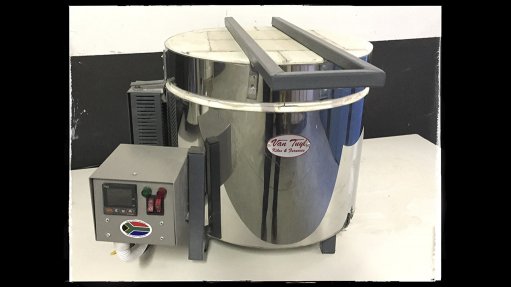
PERFECT MATCH The new controller will be compatible with Van Tuyl’s existing furnaces range
There has been an increase in demand for customised furnaces from the mining industry, says South Africa-based kiln and furnace manufacturer Van Tuyl Kilns and Furnaces director Richard McCullough.
He tells Mining Weekly that mining companies are requesting smaller, customised electric furnaces to use on site at their operations, which are often remote. The most common feature companies are looking for when customising their furnaces is safety, energy efficiency and the speed at which they can heat up to the required temperature.
“The unit also has to be fairly robust because it operates in a harsh environment.”
McCullough adds that an advantage of Van Tuyl designing the unit to client specifications is that it allows for the production element to run more efficiently.
Van Tuyl has been involved in developing several small customised furnaces for global small mining houses, both locally and within the Southern African Development Community countries.
“We sat down with small mining houses and asked them what they wanted . . . and we designed the furnaces accordingly.”
McCullough explains that Van Tuyl started with one of their existing small smelting furnaces improving the insulation and including safety features, such as fuses and cut-out switches, to stop power supply to prevent people from either damaging the unit or hurting themselves.
The 220 V units are energy efficient and portable, weighing around 50 kg, and being able to accommodate a 7 kg crucible. They can easily be refurbished within 48 hours for a quarter of the cost, instead of replacing the entire unit, he adds.
Additionally, the company provides and manufactures programmable controllers designed for the management of furnaces, which enable operators to manage the temperatures of the furnace within the specific parameters and designed programmes.
McCullough says Van Tuyl is conducting research and development on a new digital controller that can be controlled from a phone via an application. Van Tuyl is working with an international company to adapt and develop this to suit South African and other African customers.
A key advantage of this digital controller is that, from an industrial point of view, the progress and management of kilns can be monitored from any location and the data of each programme can be recorded. The unit will also be very competitively priced compared with those currently on the market.
The controller will be subjected to another six months of research, development and testing, during which time Van Tuyl will make it adaptable to the South African market.
“It is going to be beneficial for the industry that wants to manage and review its previous processes and how kiln management has improved.”
He notes that this controller will be compatible with Van Tuyl’s existing furnaces range and most other suppliers' furnaces will fit into its current manufacturing processes. This will enable companies that own older models to easily upgrade to the new unit.
Industry Challenges
McCullough notes that one of the challenges that the company has been facing is the acquisition of the high quality insulation materials like bricks and element wires that are fitted to furnaces. Locally made insulation bricks have a high level of iron, which make them unsuitable for use in electrical furnaces, he points out.
As a result, Van Tuyl imports its insulation materials, which can be quite costly. The demand for high temperature insulation materials in the African market is small, so there is actually not a market in South Africa for manufacturers of those types of bricks, he says.
Exacerbating this challenge is the import and export restrictions on furnace components, and McCullough suggests that the African continent would be a “great market” if some of these restrictions were lifted to make business across Africa easier.
“What we tend to find is that it's more difficult to do business in Africa than . . . in other territories.”